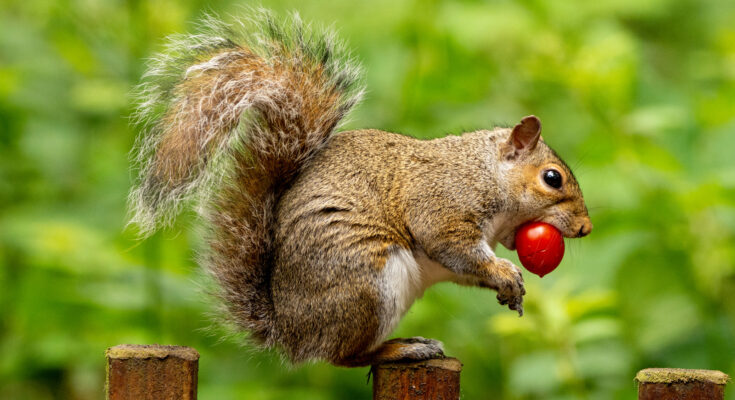Can You Stop Squirrels From Snacking On Garden Tomatoes?
We may receive a commission on purchases made from links.
Squirrels are adorable, furry woodland creatures, but they’re not so precious when they start snacking on your hard-earned vegetable haul. When these twitchy critters start gunning for your tomatoes, it’s a frustrating situation. Both ground squirrels and tree squirrels can be a nuisance around tomato plants, but evidence of their stealthy activities is easy to spot.
The most obvious sign of a squirrel problem is the presence of shallow holes in your garden. Their digging habits are a big problem for freshly planted gardens since they disrupt seed germination by pulling up your growing seedlings. On mature tomato plants, you may even find partially eaten tomatoes or flowers, courtesy of your not-so-friendly neighborhood squirrels.
Is it possible to completely deter squirrels from your tomatoes? The truth is, you probably can’t keep them out of your garden completely. Squirrels are quick, agile, mischievous, and persistent. And while there are some ways to slow them down to protect your prized tomato plants, they’ll probably keep coming back to try. The good news is there are some tried-and-true squirrel pest control methods that make it quite difficult or unpleasant for these critters to invade your garden completely. The key is to employ a combination of methods that keep twitchy squirrels on their toes so you can win the war against their destruction — even if you lose a battle or two.
How to slow squirrels down in your tomato garden
The most effective way to keep squirrels out of your garden is to create a barrier that’s as impenetrable as possible. You can create a traditional wood fence or you can go with a simpler, more temporary version with high-quality hardware cloth or chicken wire. If tree squirrels are your likely pest, this barrier will need to completely surround your tomato plants — both on the sides and on the top.
Keep in mind your barrier top cover needs to allow you access to care for your tomato plants throughout the season. This cover can be as simple as plastic bird netting that’s kept in place by clothespins which you can remove when watering or pruning. Since squirrels are expert diggers, you’ll also need your fence to sink at least 6 inches into the ground around your garden.
If you’re not able to build a structural barrier to keep squirrels away from your tomatoes, there are some quick and easy methods that create an unpleasant environment for squirrels. For example, you can strategically place aromatic plants like onions, garlic, and catnip around the tomato plants since squirrels dislike the smell. They also dislike the smell of peppermint and hot pepper. You can find powder or liquid versions of these products to use around the base of plants or even directly on leaves. Just be sure the product is safe for vegetable plants.
When all else fails, resolve to share
If you’ve been dealing with a high squirrel population or even just a few exceptionally persistent squirrels, it’s unlikely your tomato plants will make it through unscathed. However, there’s still one more solution: Plant proactively knowing you’ll be sacrificing some of your tomato haul to the squirrel overlords. Even just one additional tomato plant will give you plenty of extra tomatoes to account for the loss that these critters will gobble up.
It’s interesting to note that tomatoes aren’t squirrels’ top choice when foraging. They sometimes feed on ripe tomatoes simply due to the moisture content. They’re searching for both water and food on sweltering summer days, and tomatoes provide both hydration and sustenance. With this in mind, you may want to try creating a distraction for them, such as an area placed some distance away from your garden that’s stocked with water and food. You can even place a sacrificial tomato plant next to it as a trap crop to veer them away from your main, in-ground garden plot or raised garden bed. This is a great method for preserving your hard-earned tomatoes while sharing some love with your local wildlife.



